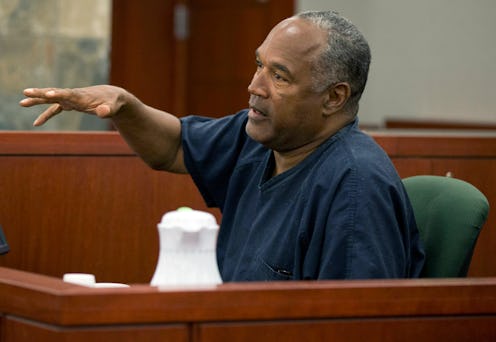News
How To Help End Domestic Violence After Watching 'O.J. Simpson: The Lost Confession'

Fox's Sunday night special on one of the most famous murder cases in history made at least one thing clear: Domestic violence is not to be taken lightly, even if the allegations are against a celebrity athlete. And if you feel like you want to donate to domestic violence relief after watching O.J. Simpson: The Lost Confession?, there are plenty of options to choose from. Though O.J. Simpson has ultimately denied beating his wife, he's also admitted that he's responsible for "any marks on her."
The main focus of Fox's two-hour TV special was the long lost interview footage of Simpson's never-aired, hypothetical confession to the murder of his ex-wife Nicole Simpson Brown and her friend Ronald Goldman. But the TV special also touched on one aspect of Nicole's life before she was murdered: that she allegedly suffered from spousal abuse.
Simpson's history of domestic abuse allegations was well-documented and was reportedly one of prosecutor Marcia Clark's main reasons for trying to put Simpson behind bars after his ex-wife's murder. In 1989, The New York Times reported that Simpson pleaded no contest to spousal abuse charges after his wife was so badly hurt that she had to be taken to the hospital. Instead of serving jail time, he got counseling from a psychiatrist of his choice.
And during a deposition with Daniel Petrocelli, the attorney for the Goldman family during Simpson's 1997 civil trial, he admitted to both bruising and physically hurting Nicole.
"I think any marks that's on her, I take full responsibility for," Simpson said during the deposition. "I don't know what else you want to do. I take total responsibility"; these tapes weren't released until 2015.
Ultimately, Simpson denied any domestic violence allegations during the 1997 civil trial and claimed he'd never done anything more than "rassle" with his ex-wife.
Fox recognized this aspect of the Simpsons' tumultuous relationship by including Rita Smith in its team of panelists. Smith is an adviser to the NFL on matters regarding domestic violence and sexual assault. Simpson, a retired football player, is one of many current and former NFL players accused of physical or sexual assault.
Regardless how many of the allegations against Simpson are true, national statistics from the Bureau of Justice reveal a disheartening story across the board. The Violence Policy Center reports that almost three women are killed every day in the United States by their current or former romantic partners. Simpson was found not guilty of the murder of his ex-wife and her friend.
If you are looking for ways to combat domestic violence, here's how you can help.
Don't Ask "Why Didn't You Just Leave?"
People often judge women for not leaving their abusers. But as survivors have revealed, there are many complicated reasons why women don't leave their abusive partners. If someone tells you about their experiences, listen and ask how you can help. The "simple" solution of just leaving might not be that easy.
Volunteer Remotely
Rita Smith, one of the panelists analyzing Simpson's 2006 interview, served as the executive director of the National Coalition Against Domestic Violence for nearly 23 years. The organization offers volunteering opportunities, most of which are virtual or telework.
Help Your Local Domestic Violence Program
The National Coalition Against Domestic Violence also lists state organizations working to end domestic violence. Contact your local chapter to see if can get involved with community initiatives. If you're lacking time to volunteer, you can also make a donation.
Donate Items To a Women's Shelter
Women and children who escape abusive homes can be leaving a lot behind, such as a financial security, a house, most of their wardrobe, and other belongings. Consider making a donation to your local women's shelter. Call first to ask what items would be beneficial. You can also search for wishlists online at DomesticShelters.org.
Support An Organization For A Specific Demographic
Domestic violence occurs across all races, socioeconomic statuses, and geographic regions — some organizations allocate resources to specific groups. You could make a donation, for instance, to National Center on Violence in the Black Community. Black women comprise about half of female homicide victims, the majority of whom are killed by current or former boyfriends or husbands.
The Initiative is another organization, which focuses on persons with disabilities who are victims of abuse. Lastly, Mending the Sacred Hoop works to end violence against Native American women.
Educate Yourself
Taking the time to learn about domestic violence, how abusers trap their partners, and what survivors need is often the first step before doing anything helpful. There are many online tools and resources available so you can arm yourself with the knowledge to help end domestic violence.
Though the murder of Nicole and Goldman remains a mystery, one thing is for sure: the Simpson saga helped usher in a level of awareness about domestic violence. In 1996, the United States passed a law restricting the possession of firearms by individuals convicted of a misdemeanor in domestic violence. And following Simpson's July 2017 parole hearing, Nevada lawmakers proposed a bill that required an inmate's history of domestic violence to be considered before parole is granted.